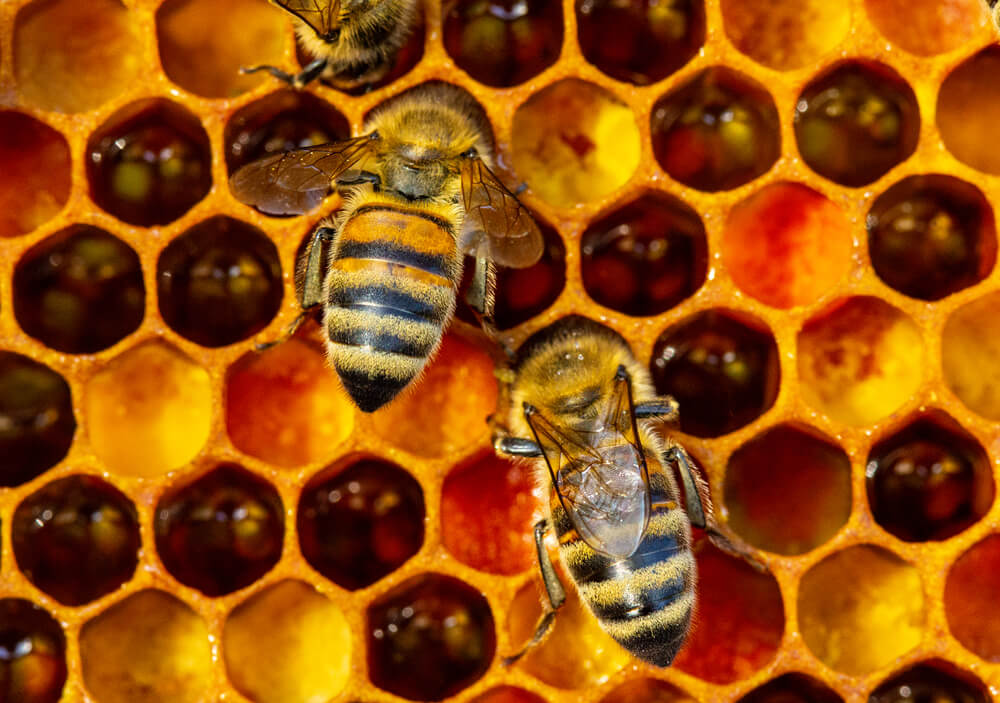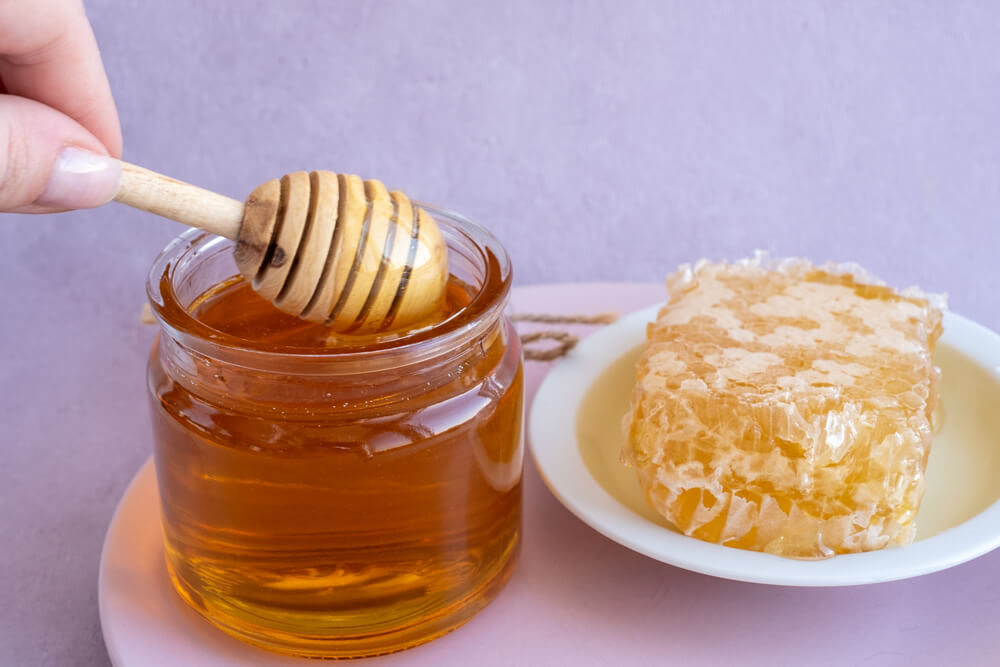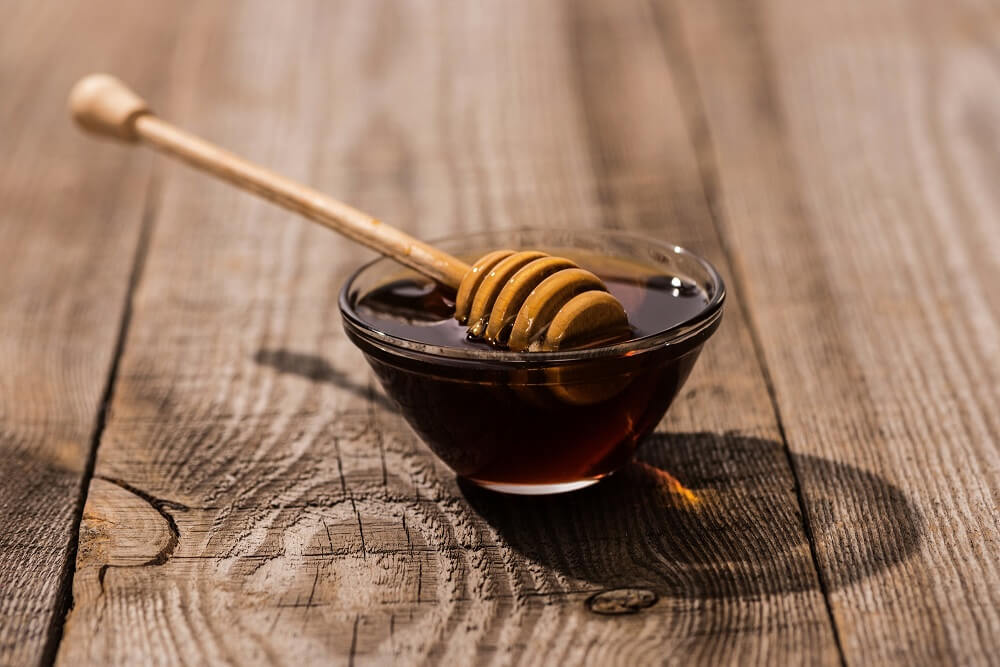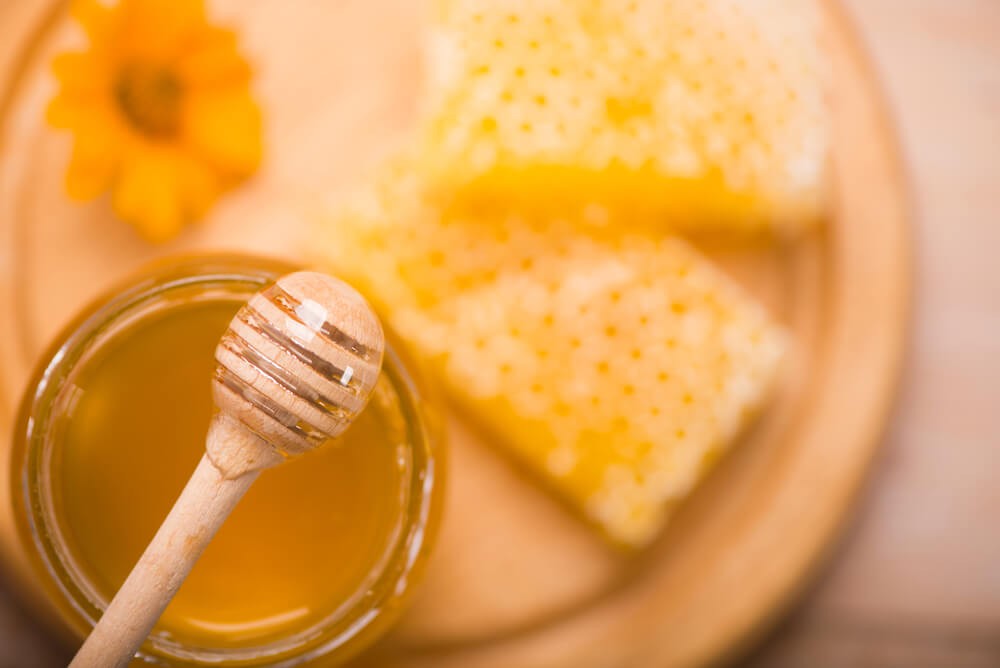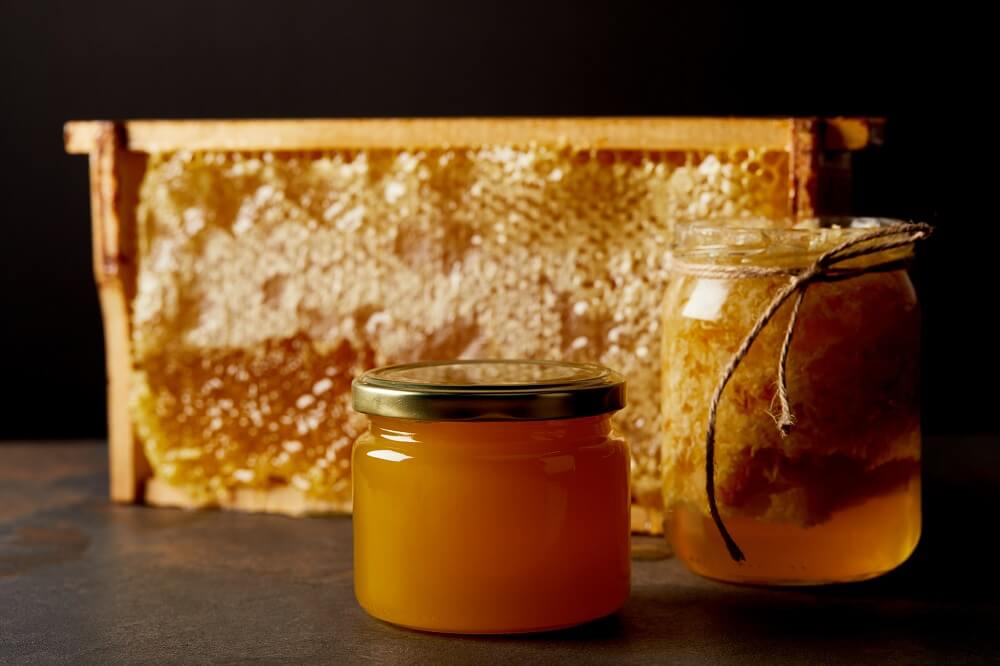Table of Contents:
What is Eucalyptus Honey?
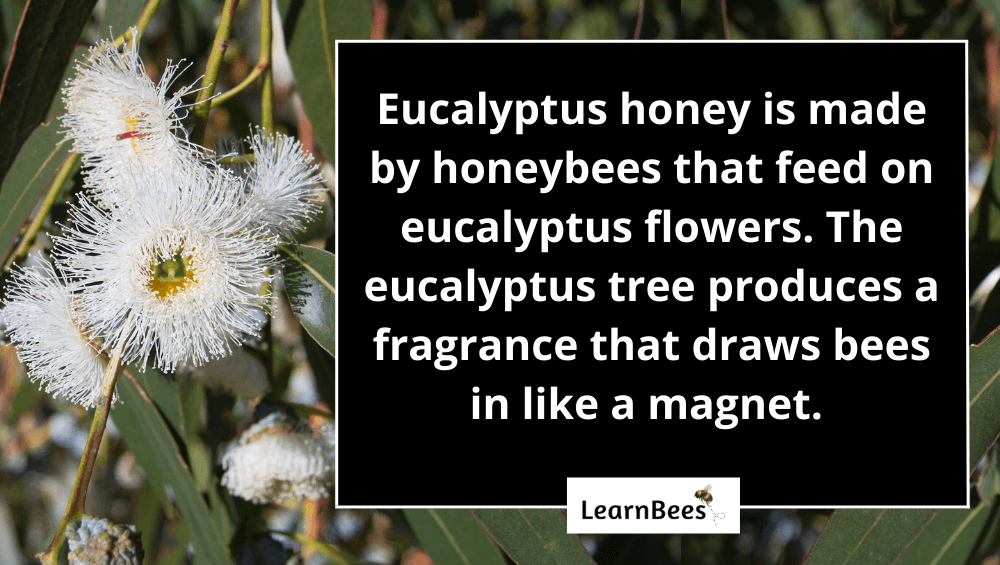
Eucalyptus honey is produced by honeybees that feed on eucalyptus flowers.
The eucalyptus tree is native to Australia. The flowers bloom in pretty shades of red, orange, pink, and white. Eucalyptus blossoms add gorgeous bursts of color to any landscape.(1)
But the best part about them?
The smell.
The foliage produces a delicious aroma that entices honeybees by the thousands. Eucalyptus trees have a minty pine scent with a touch of sweetness.
Inhaling eucalyptus opens your sinuses and feels like a breath of fresh air.
But what does eucalyptus honey taste like?
It’s an interesting mix of sweet and herbal.
Raw eucalyptus honey includes subtle notes of menthol, caramel, and butterscotch. It has a medium sweetness that isn’t overpowering like other types of honey. It pairs well with tea, along with breakfast foods such as toast, bagels, and muffins.
More importantly:
Eucalyptus honey is handy during cold and flu season. A spoonful of this honey is useful for opening up the sinuses and soothing sore throats. The menthol notes make it a powerhouse for nasal congestion.
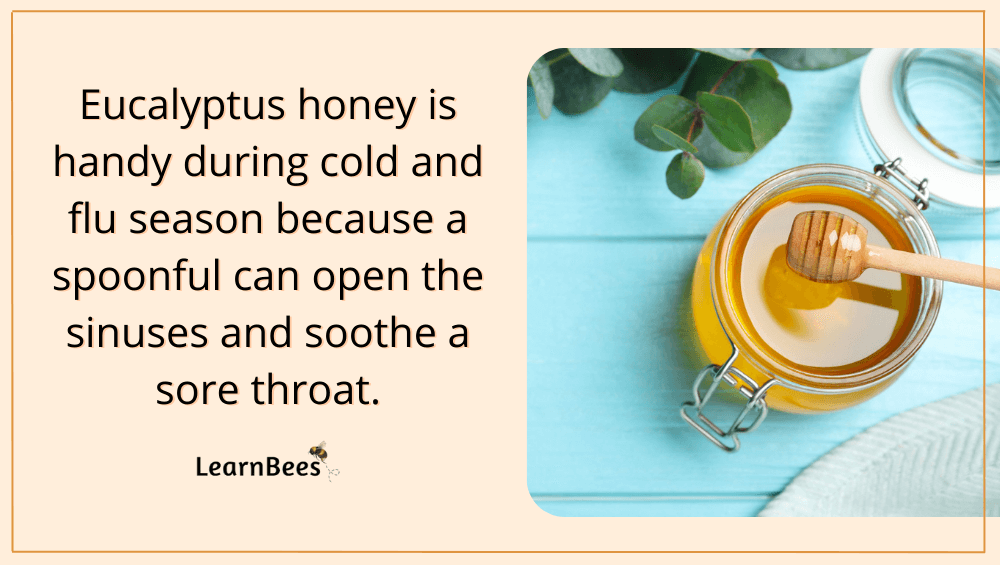
But I should issue a quick disclaimer.
These health benefits come from raw eucalyptus honey.
Raw honey is honey that hasn’t been heated or processed. It’s straight from the beehive in its purest form.
Why is this important?
Because some manufacturers process honey to the point where it’s no longer considered real honey.
Honey loses its beneficial enzymes and antioxidants when overheated during the pasteurization process. This can reduce the honey’s ability to treat coughs, sore throats, and skin wounds.(2, 3)
And just as important:
Processed honey often includes artificial sweeteners such as sugar or high fructose corn syrup. As such, the FDA warns that overly processed honey is no longer considered authentic honey.(4)
But raw honey, on the other hand?
It’s the purest form of honey you can get. It hasn’t been heated, filtered, or diluted with other ingredients. It’s left just the way nature intended it.
So our suggestion is this:
If you want both the delicious taste and health benefits of honey, then raw eucalyptus honey is the way to go.
And as a general rule, always look for honey labels that say “raw” on them. Skip the plastic teddy bear containers from the grocery store.
What Are the Benefits of Eucalyptus Honey?
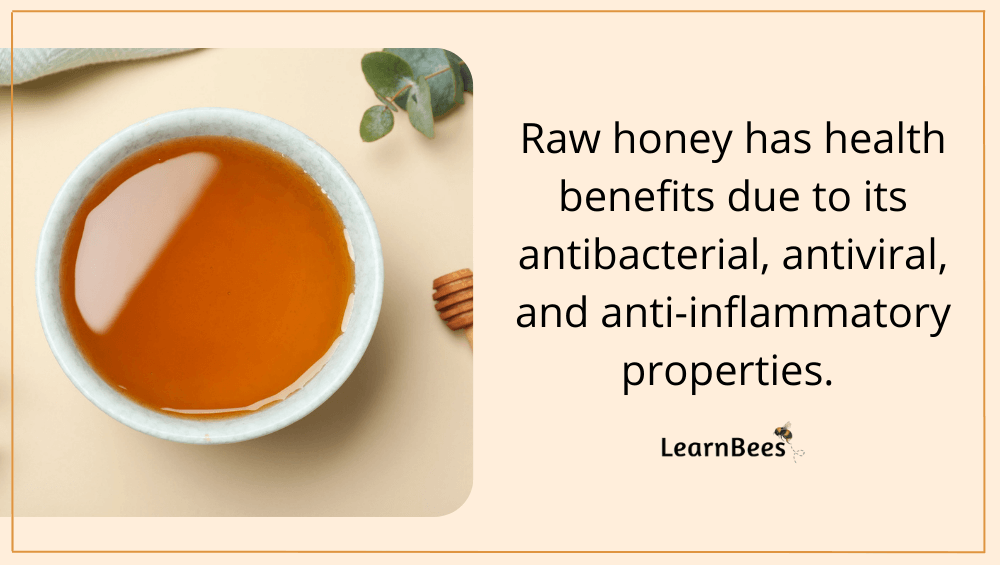
Raw honey has been used for medicinal purposes for centuries. Honey usage dates back to ancient Egypt over 3,000-years-ago.
But keep in mind:
There are over 300 varieties of honey. Examples include clover honey, wildflower honey, and buckwheat honey. That said, we don’t have clinical research on every single type of honey.
However, raw honey as a whole has proven health benefits due to its antibacterial, antiviral, and anti-inflammatory properties.
So let’s discuss a few:
Benefit 1: Raw Honey is Rich in Antioxidants

Raw honey contains flavonoids and phenolic acids, which are antioxidants that help protect the body against cell damage. Damage to the cells can lead to conditions like premature aging, type 2 diabetes, and heart disease.(5)
Certain types of honey have as many antioxidants as fruits and vegetables.
The antioxidant compounds found in raw honey have anti-inflammatory effects that could be beneficial in protecting against several conditions associated with oxidative stress.(6)
The raw version of honey can also have pollen and bee propolis, which may have added benefits.
One study suggests that raw honey may positively affect the respiratory, gastrointestinal, cardiovascular, and nervous systems.(7)
Benefit 2: Raw Honey Can Promote Wound Healing
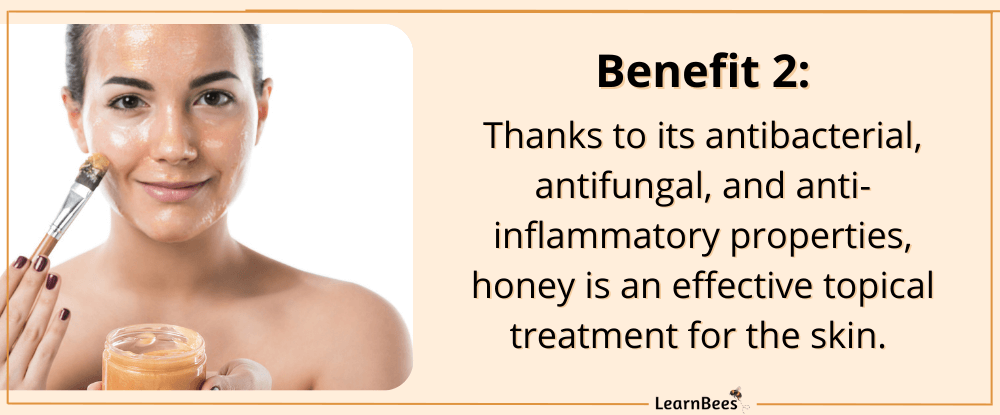
Thanks to its antibacterial, antifungal, and anti-inflammatory properties, the use of topical honey treatments is significant.(8)
A review of studies found that honey has antimicrobial properties. Another study suggested that honey may have potential health benefits for microbial inhibition and wound healing.(9, 10)
A review of studies on honey found that it helped heal burns and wounds that became infected after surgery.(11)
Honey can be used to help treat diabetes-related foot ulcers. These are serious complications that can lead to amputation.
According to one study, honey had a 43.3% success rate for people with diabetes-related foot ulcers. In another study, topical honey was found to heal 97% of participants’ diabetes-related ulcers.(12)
In addition, it may help to treat other skin conditions such as psoriasis and herpes lesions.(13)
Benefit 3: Raw Honey Can Soothe Coughs and Sore Throats
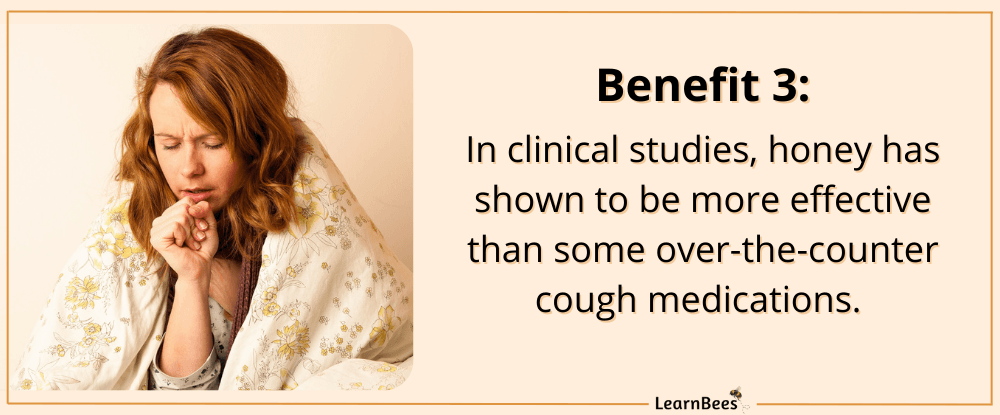
Coughing is a common issue for children with upper respiratory infections, and it can affect sleep quality for both children and their parents.
Luckily, raw honey may be an excellent alternative to common cough medications, with evidence indicating it’s an effective treatment option.(14)
One review on honey and cough found that honey is more effective than diphenhydramine (a cough medicine ingredient) for suppressing cough symptoms.(15)
What’s more, honey may help reduce the duration of coughing fits.
A review of studies showed that honey could be successful at treating upper respiratory infections.(16)
Another study found that honey may also improve sleep quality among children and parents with coughs.(17)
And, unlike some cough medicines, honey doesn’t have any side effects.
However, it’s important to note that honey should never be given to children under one years old due to the risk of infant botulism.(18)
Benefit 4: Raw Honey May Promote Heart Health

Some studies have shown that raw honey may help prevent heart disease.
In one study, 4,500 people found that honey intake was associated with a lower risk of high blood pressure in women.(19)
According to one review, honey may improve blood fat levels, help regulate your heartbeat, and lower blood pressure. As a result, this leads to better heart health overall.(20)
Also, a rat study showed that honey helped protect the heart against oxidative stress.(21)
Raw honey also contains propolis, a resin that honeybees make from sap-producing trees. This substance has cholesterol-lowering and triglyceride-lowering effects.(22)
What Are the Risks of Eucalyptus Honey?
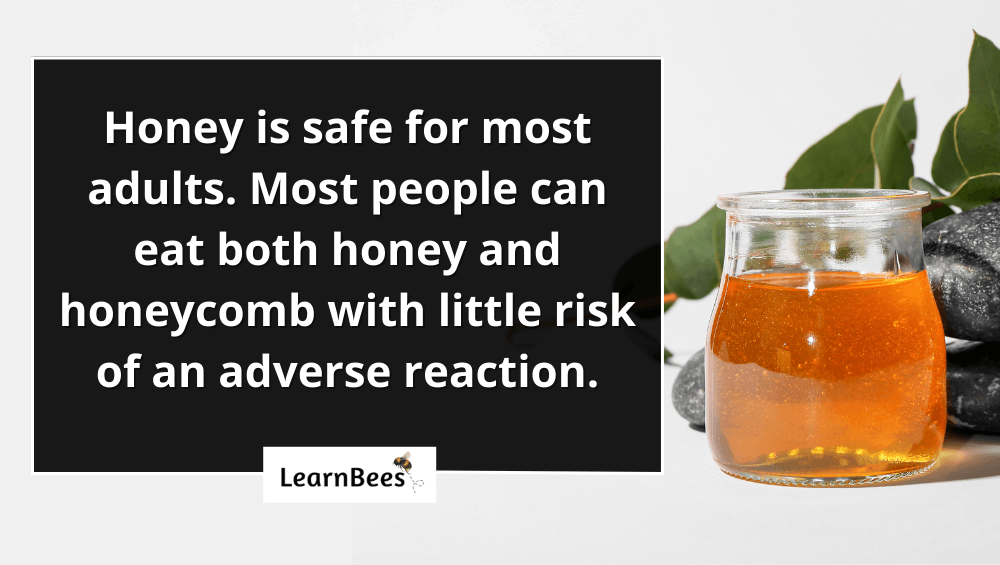
Honey is safe for most adults. Most people can eat both honey and honeycomb with little risk of an adverse reaction.
So are there any side effects of eucalyptus honey?
Yes, there are two risks to keep in mind:
Risk 1: Raw Honey Can be Harmful to Babies under 12 Months
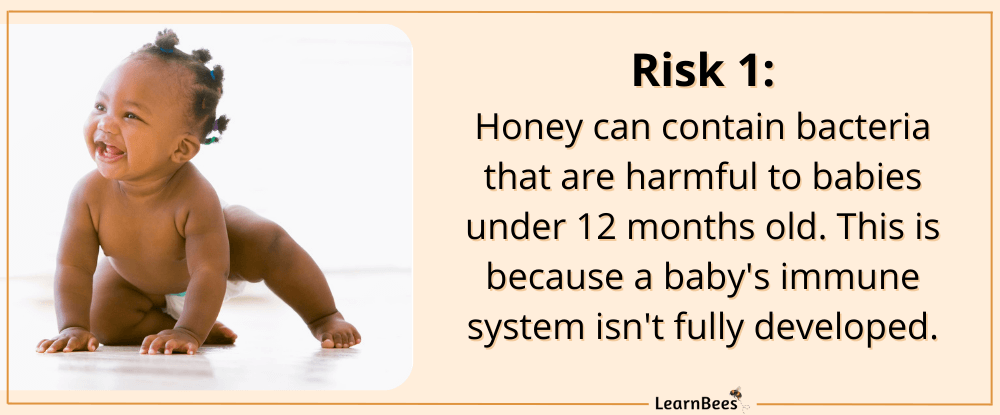
Children under the age of one should not eat honey because of the risk of infant botulism.
Botulism is a rare but life-threatening illness produced by the bacteria Clostridium botulinum. The condition can affect the nervous system and lead to paralysis and respiratory failure.
Infants and children under 12 months old are the most likely to get botulism from honey. This is because they don’t have the immune system to fight the bacteria.
Risk 2: Raw Honey Can Raise Blood Sugar Levels in Diabetics
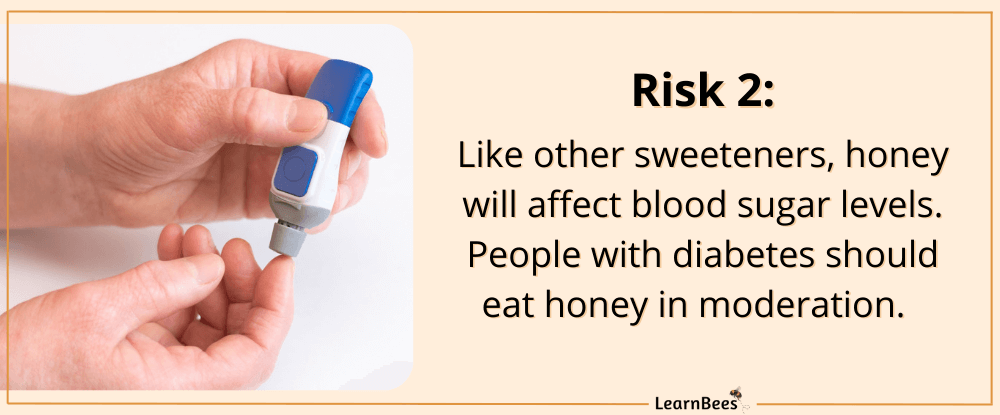
If you have diabetes or are at high risk, you might’ve heard that honey is better for you than other sweeteners.
But although honey has health benefits, it’s still a source of sugar and carbohydrates. If you have diabetes, you need to manage your carbohydrates throughout the day, especially when using insulin.
Both honey and sugar will raise your blood sugar level, so they should be eaten in moderation.
FAQs on Eucalyptus Honey
- What color is eucalyptus honey?
- How do you take eucalyptus honey?
- Is eucalyptus honey safe?
- Is eucalyptus honey better?
- Is raw eucalyptus honey good for you?
- What does eucalyptus honey taste like?
- Where does eucalyptus honey come from?
- Is eucalyptus honey tea good?
- Is eucalyptus honey for skin beneficial?
- What’s the difference between eucalyptus honey vs. manuka honey?
- Where can I buy eucalyptus honey?
What color is eucalyptus honey?
Eucalyptus honey ranges from light golden to medium amber, depending on the type of eucalyptus trees the honeybees pollinate. There are over 700 species of eucalyptus trees, so the honey can vary slightly from bottle to bottle.
—> Go back to the FAQs on Eucalyptus Honey
More to Explore:
How do you take eucalyptus honey?
People often wonder how to use eucalyptus honey properly.
The answer is that you can eat honey in several ways. For one, you can eat it directly off the spoon. But be careful about double-dipping because you don’t want to contaminate the honey jar with bacteria.
Honey has an eternal shelf life if stored correctly. Proper storage and usage prevent moisture and bacteria from creeping in.
You can also eat eucalyptus honey with other foods. For example, you can add honey to your oatmeal or yogurt. You can drizzle honey on top of toast or pancakes. Eucalyptus is also found in medicinal products such as honey eucalyptus cough drops.
One of the best ways to take eucalyptus honey is in tea. It has a slight menthol flavor that pairs well with most herbal teas.
To make eucalyptus honey tea, simply add a teaspoon of honey to a cup of hot tea. You can also add a slice of lemon for extra flavor.
—> Go back to the FAQs on Eucalyptus Honey
More to Explore:
- The Top 3 Best Manuka Honey Brands
- Orange Blossom Honey: Uses, Benefits, & Risks
- Sourwood Honey: Uses, Benefits, & Risks
Is eucalyptus honey safe?
People often ask, “Can you eat eucalyptus honey?”
Yes, honey is safe for most adults. Most people can safely eat both honey and honeycomb with little risk of a bad reaction.
However, there are two risks to keep in mind:
Children under the age of one shouldn’t eat honey because of the risk of infant botulism. Botulism is a rare but potentially fatal condition caused by the bacteria Clostridium botulinum.
The illness can affect your nervous system and lead to paralysis and respiratory failure.
Infants and children younger than 12 months old are more likely to get botulism from honey. This is because they haven’t built up the immune system to fight off the bacteria.
The second risk is that raw honey can raise blood sugar levels in people with diabetes. If you have diabetes, you might’ve heard that honey is an excellent natural sweetener.
Honey has health benefits, but it is still a source of sugar and carbohydrates. If you have diabetes, you need to count how many carbohydrates you eat during the day. This is especially important when using insulin.
Both honey and sugar can cause your blood sugar level to go up, so be cautious of eating them on a regular basis.
—> Go back to the FAQs on Eucalyptus Honey
More to Explore:
Is eucalyptus honey better?
Eucalyptus honey has a distinct taste, but it ultimately depends on your preferences. Some people prefer the taste of eucalyptus honey, while others prefer different types of honey. Also, remember that there are hundreds of varieties of eucalyptus trees.
Eucalyptus honey has similar health benefits to other types of honey. For example, it’s full of antioxidants and enzymes and contains small amounts of nutrients such as vitamin c. Overall, honey has many medicinal properties because it’s a rich source of vitamins.
Store the honey in an airtight container at room temperature.
—> Go back to the FAQs on Eucalyptus Honey
More to Explore:
- The Brutally Honest Truth About Sour Honey
- Buckwheat Honey: Uses, Benefits, & Risks
- Can You Eat Honeycombs?
Is raw eucalyptus honey good for you?
People often ask:
What is eucalyptus honey good for? What are the health benefits of eucalyptus honey?
Yes, raw eucalyptus honey has health benefits. A few benefits of such honey include:
- Honey is antibacterial, antiviral, and anti-inflammatory
- Honey can promote wound healing for burns, cuts, and insects bites
- Honey can improve heart health
- Honey can relieve upper respiratory infection symptoms
—> Go back to the FAQs on Eucalyptus Honey
More to Explore:
What does eucalyptus honey taste like?
Eucalyptus honey has a unique taste that is both sweet and slightly minty. The sweetness isn’t overpowering like other types of honey, making it a good choice for people who don’t like overly sweet foods.
The menthol flavor is also refreshing, making it a good choice for people who want a light and delicate taste. It has a similar smell to eucalyptus essential oil but is much milder in the aroma.
—> Go back to the FAQs on Eucalyptus Honey
More to Explore:
- Acacia Honey: The Taste, Health Benefits, & Risks
- What is Longan Honey?
- Honey for Skin Benefits: Directions, Uses, & Risks
Where does eucalyptus honey come from?
People regularly ask, “How is eucalyptus honey made?” and “How can you tell it’s organic honey?”
This honey is a variety of honey made by honeybees that collect nectar from eucalyptus plants. Eucalyptus honey is a type of monofloral honey, which means that the bees only collect nectar from one type of flower.
The eucalyptus tree is native to Australia, but it can also be found in other parts of the world, including California and South Africa.
When shopping for honey, make sure the label says it’s “raw.”
—> Go back to the FAQs on Eucalyptus Honey
More to Explore:
Is eucalyptus honey tea good?
Yes, many people enjoy mixing eucalyptus honey with hot tea. This is because the menthol flavor of this distinctive honey pairs well with the floral notes of most herbal teas.
If you want to try this combination, simply add a teaspoon of eucalyptus honey to a cup of hot tea. You can also add a slice of lemon for extra flavor.
You can also pair eucalyptus honey with other things, such as salad dressings or meat glazes.
—> Go back to the FAQs on Eucalyptus Honey
More to Explore:
Is eucalyptus honey for skin beneficial?
Yes, raw honey offers numerous health benefits because it’s antibacterial, antiviral, and anti-inflammatory. Honey is a source of potent polyphenols. These properties make honey an effective treatment for acne, eczema, and other skin conditions.
Several clinical trials have shown honey to be an effective treatment for the skin.
—> Go back to the FAQs on Eucalyptus Honey
More to Explore:
What’s the difference between eucalyptus honey vs. manuka honey?
Eucalyptus honey and manuka honey are beneficial for health, but they have some key differences.
Manuka honey is produced in New Zealand and Australia, while eucalyptus honey is produced in other parts of the world, including Australia, California, and South Africa.
Manuka honey is more expensive than eucalyptus honey because it’s rarer.
Eucalyptus honey has a unique flavor that is both sweet and slightly minty, while manuka honey has a more robust flavor. The taste of manuka honey is somewhat nutty with an earthy undertone.
As for health benefits, it’s hard to compare them. Manuka honey has been widely studied in clinical settings, while eucalyptus honey has not. That said, raw honey – no matter the type – has been shown to provide antibacterial and anti-inflammatory benefits. They also both show promising cough suppressant benefits.
—> Go back to the FAQs on Eucalyptus Honey
More to Explore:
Where can I buy eucalyptus honey?
You may find eucalyptus honey from a local beekeeper depending on where you live. You can also find eucalyptus honey online. Just make sure you’re buying raw eucalyptus honey instead of the processed stuff.
